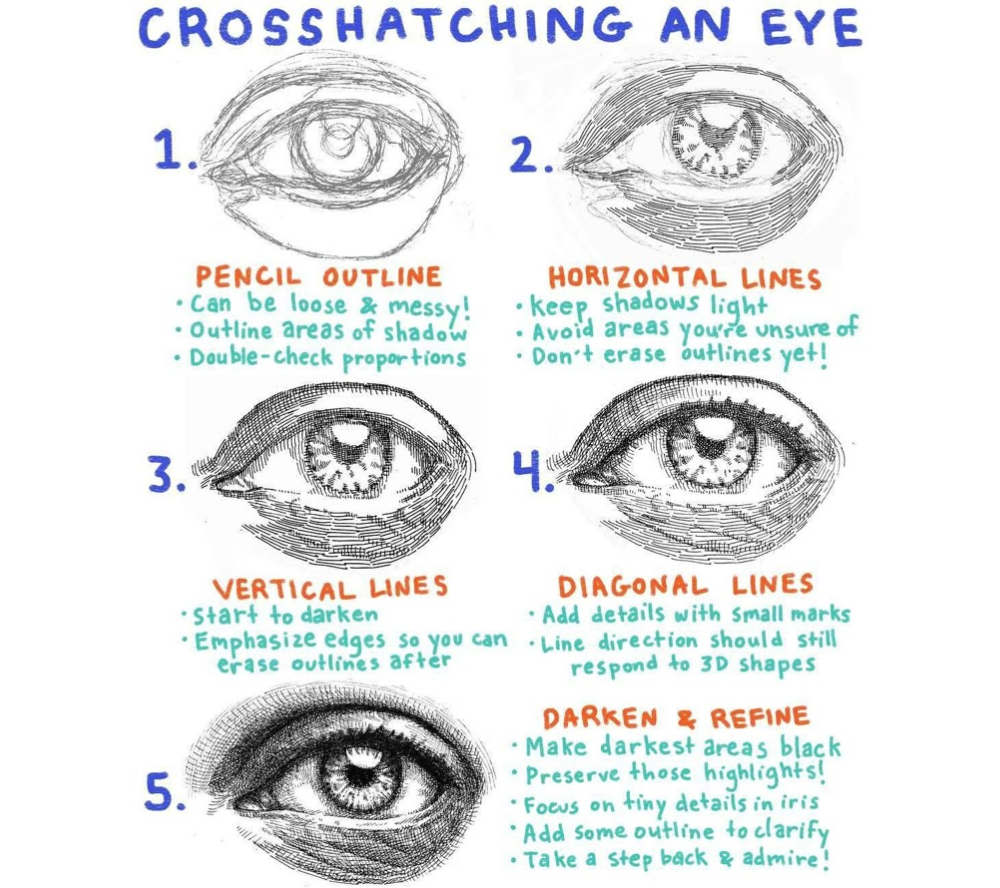How to Crosshatch a Realistic Eye: Step-by-Step Guide

Materials Needed
✏️ 2H & 2B pencils
📄 Smooth sketch paper
🧽 Kneaded eraser
🔍 Magnifier (optional for details)
1. Pencil Outline (Loose but Accurate)
-
Sketch lightly:
-
Almond shape for eye opening
-
Circle for iris (slightly covered by upper lid)
-
Mark shadow areas:
-
Crease above eyelid
-
Outer eye corner
-
Under lower lid
-
-
Tip: “Imagine the eyeball as a sphere—shadows wrap around it.”
2. Horizontal Lines (First Layer)
-
Follow the eye’s curvature:
-
Upper lid: Lines curve downward
-
Lower lid: Lines curve upward
-
-
Pressure:
-
Light for mid-tones
-
Skip highlight areas (tear duct, iris reflection)
-

3. Vertical Lines (Build Depth)
-
Darken strategic areas:
-
Eyelid crease
-
Outer eye socket
-
Top 1/3 of iris (natural shadow)
-
-
Blend: Use a stump for smooth transitions
Common Mistake: Avoid straight verticals—curve lines with the eyeball’s roundness.
4. Diagonal Lines (Refinement)
-
Iris details:
-
Radiating strokes from pupil
-
Leave a white spot for reflection
-
-
Eyelashes:
-
Draw from lid outward (vary lengths)
-
Cluster at outer corner
-
5. Final Darkening & Polish
⚫ Deepest Shadows:
-
Pupil (solid black)
-
Upper lash line
-
Corner of eye socket
✨ Preserve Highlights: -
Erase any stray marks on cornea reflection
-
Add subtle white gel pen dots for wetness
Pro Tip: “Squint at your drawing—the value contrast should read clearly from a distance.”
Eye Crosshatching Checklist
| Done? | Task |
|---|---|
| ☑ | Curved horizontal layers |
| ☑ | Vertical shadow building |
| ☑ | Iris radial details |
| ☑ | Highlight protection |
Why This Works
-
3D Illusion: Layered lines mimic eye contours
-
Emotion Control: Darker upper lid = more intense gaze
-
Efficiency: Diagonal lines suggest texture without overworking
Style Variations:
-
Cartoon: Exaggerate lash clusters
-
Hyper-Realistic: Add veining in whites
Need Help? I can:
-
Provide an eye anatomy reference sheet
-
Demonstrate tear duct shading via video
-
Share iris color techniques (for brown/blue eyes)
(Art credit: Techniques adapted from Burne Hogarth’s “Drawing Dynamic Eyes”)
